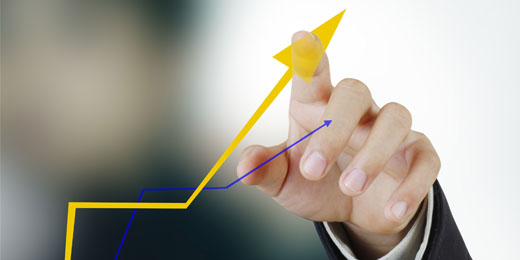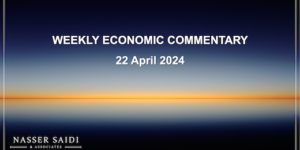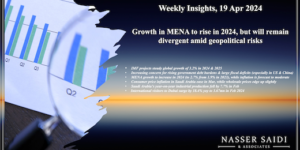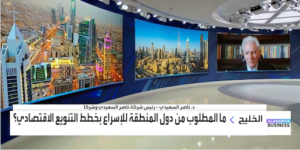Markets
US equities rose once again last week, with the S&P 500 beating another record, supported by a Senate vote to stop the government shutdown and upbeat corporate earnings releases. Elsewhere the mood was less cheerful with the European and Japanese bourses retrenching for fear that the sliding US dollar would hurt corporate profits. Indeed the greenback fell sharply on remarks by US Treasury Secretary Mnuchin favoring a weak currency and the broad-based weakness were counterintuitively exacerbated by Draghi’s dovish (but for traders not dovish enough) remarks during the press conference. Oil prices continued their uptrend shrugging off the optimistic IEA forecasts on US production. Gold prices remain well bid in the wake of the US dollar slump.
Global Developments
US/Americas:
- US GDP growth rose 2.6% qoq ann, against expectations of a 3.0% expansion and 3.2% in Q3. Consumption rose 3.8% and private investments 3.6%, especially machinery and residential expenditures. External trade was hit by a 13.9% soar in imports. Real disposable income gained only 1.1% qoq ann, after rising 0.5% in Q3. The saving rate fell to 2.6%, its lowest level since 2005.
- US core personal consumption expenditures accelerated by 0.1% in Q4 to 1.5% yoy and personal income growth was almost stable at 0.9% qoq ann.
- US core PCE inflation shot up to 1.9% yoy in Q4 from 1.3% in Q3, close to the 2% inflation target set by the Fed.
- Thanks to a continuing resolution, the US Congress managed to avoid a protracted government shutdown, providing funds until 8 February.
- The IHS Markit US Composite PMI fell to 53.8 in Jan from 54.1 in Dec. Services growth slowed to a 9-month low (53.3 from 53.7 in Dec) while manufacturing rose the most since Mar 2015 (55.5 from 55.1 in Dec).
- The Conference Board’s Leading Indicators Index rose by 0.6% in Dec following a 0.5% increase in Nov, with most subcomponents on the rise.
- The US goods trade deficit in Dec rose to USD 71.58bn from USD 69.99bn in Nov.
- US durable goods orders jumped by 2.9% mom in Dec thanks to transport orders, but non-defense capital goods orders (excluding aircraft) declined -0.3% mom.
- Jay Powell has been confirmed by the US Senate as the next Chairman of the Federal Reserve Board, replacing Janet Yellen. It is unlikely that the central bank policy will drastically shift.
- US new home sales plunged by -9.3% mom in Dec, way below expectations of 7.9% mom. The Nov growth was revised by 2.5% to 15.0% mom. The longer-term trend point still North since its 2011 low.
- US existing home sales declined by -3.6% mom (1.1% yoy) in Dec partially offsetting the 5.6% mom surge in Nov.
- Initial claims for unemployment insurance benefits rose 17,000 to 233,000 after a 45,000 decline in the previous week. The 4-week moving average fell 3,500 to 240,000 and continuing claims slid 28,000 to 1.937 mn.
- US wholesalers’ inventories advanced by 0.2% mom in Dec vs 0.7% in Nov. Retailers’ inventories grew a modest 0.2% but excluding autos and parts they advanced 0.6%.
Europe:
- The ECB’s Governing Council kept monetary policy on hold, stressing that the QE programme could be extended beyond Sep and/or expanded in size if the outlook turns sour. For the time being the only sure thing is a date for starting to talk about revisions to QE within the GC.
- The Eurozone’s M3 money supply growth slowed to 4.6% yoy in Dec and M1 grew 8.6%, way below the peak of 9.8% in Sep. The main stimulus was the QE program, which boosted credit to the government, while private sector credit growth dwindled.
- The Eurozone composite PMI rose again from 58.1 in Dec to 58.6 in Jan, its highest level since Jun 2006, driven by strong gains in the services component (up 1.0 pts to 57.6), which compensated the equivalent drop in manufacturing 59.6.
- The Eurozone’s banking survey reported that credit standards continued to ease in Q4 as the net percentage of banks reporting tighter credit for corporations remained at 0% vs -1% in Q3.
- The German Ifo Business Climate Index advanced to 117.6 in Jan from 117.2 in Dec, regaining the record high set last Nov.
- The German ZEW investors’ confidence survey soared by 5.9 points to a record 95.2 in Jan, pushed by the assessment of the current situation and future expectations.
- UK consumer confidence fell further to -13 in Dec from -12 in Nov, the lowest reading in 4 years. Households are still pessimistic about the outlook, as real wages are falling and interest rates are rising.
Asia Pacific:
- Japan’s trade surplus narrowed to JPY 86.8bn in Dec from JPY 289.6bn in Nov due to sluggish export growth. Autos and tech are performing well thanks to buoyant consumer demand globally.
- Core inflation in Japan increased by 0.9% yoy in Dec, unchanged from Nov. Headline inflation was 1.0% up from 0.6% in Nov.
- South Korea’s GDP in Q4 expanded only 0.2% qoq (3.8% yoy), a low not seen since Q4 2008, but it came on the back of a 1.5% surge in Q3. The slowdown was caused by weaker exports and construction investment.
- Taiwan industrial production grew by 1.2% yoy (0.6% mom) in Dec vs 1.3% in Novin the wake of a 6.7% yoy and 6.8% yoy surge in utilities output and construction respectively. Manufacturing production grew only 0.9% yoy, after 1.7% gain in Nov.
- Singapore’s industrial production growth slumped to a 2-year low of 3.9% yoy in Dec, vs 5.6% in Nov due to a -43.6% yoy collapse in pharmaceuticals and bio output and a sharp deceleration in growth of computer and electronics production.
Bottom line: Preliminary US and Korea GDP data (together with Singapore’ and Taiwan’s industrial production, which are a gauge of global demand) portray a lapse in the global growth momentum. But, as has been the case for the past several weeks, the main market moving news came from the political arena rather than data. After kicking the can on the government shutdown the Trump administration seems bent on opening a front on trade policy with the introductions of higher duties on washing machines and solar panels. The protectionist tendency of the US Administration was further reaffirmed in Davos by Commerce Secretary Ross who stated that “We [the US] don’t intend to abrogate leadership [on free trade], but leading is different from being a sucker”. This attitude was not received well by world leaders who addressed the World Economic Forum before the speech by Trump. Chancellor Merkel in particular criticised the “polarisation” and the “poison” of populism warning on threats to international co-operation and reaffirming Germany’s commitment to multilateralism. Trump replied that “America First” is not a threat to others and a prosperous America generates prosperity, jobs and innovation for all countries, but he also warned that trade must be free but also fair with mutual benefits. On the positive side, in Germany the two major parties reached an agreement to revive the Grosse Koalition that supported Merkel’s government in the previous term.
Regional Developments
- Bahrain’s inflation rate eased to 1.3% yoy in Dec (Nov: 2.9%), thanks to the slower increase in housing and utilities prices (1% vs. Nov’s 5.1%).
- Bahrain’s Shura Council has shelved indefinitely a proposed cap on government borrowing in Bahrain – which would have been fixed at 60% of GDP. The legislation was revived by MPs after a Royal Decree raised Bahrain’s debt ceiling to BHD 10bn in Oct 2015 from BHD 7bn.
- Unemployment rate in Bahrain stood at 4% in Q2 last year. Overall workforce during this quarter touched 157k, of which 65.2% were private sector employees.
- Oil and gas projects worth USD 6bn are in the pipeline in Bahrain, according to the oil minister. Separately, it was disclosed that more than USD 13bn was being pumped into infrastructure projects (including the expansion of the airport) in a bid to support the development of the tourism sector.
- The IMF’s second review of Egypt’s reform program raised GDP growth for the 2017/18 fiscal year to 4.8% from 4.5% in a previous review; inflation is estimated to dip to 12% by Jun and to single digits from 2019, while the fuel subsidy bill is expected to decline to 2.4% of GDP from 3.3% last year.
- Egypt is planning to float shares in 8-10 State-Owned Enterprises over the next 18 months, revealed the finance minister. He did not specify the sectors or sizes of the companies under consideration.
- Egypt’s non-oil exports to the US grew by 17.5% yoy to USD 1.346bn in Jan-Nov 2017, revealed Egypt’s minister of industry and trade. Non-oil industrial exports account for 90% of the total Egyptian exports to the US. Separately, Egypt’s exports to Russia increased by 32.8% yoy to USD 44.8mn during Jan-Nov 2017 as was likely to surpass USD500mn for the first time ever for the full year 2017.
- Egypt paid USD 200mn in arrears owed to foreign oil companies in Jan; USD 550mn is due in Feb and Mar. Egypt owed foreign oil companies USD 2.4bn at end-Jun 2017.
- Iraq’s PM divulged that the war-torn country would need to raise up to USD 100bn from investors for reconstruction, especially to support infrastructure.
- Iraq has set May 12 as the date for parliamentary elections; the PM is seeking re-election.
- Jordan ends subsidies on Arabic bread: from Sat (Jan 27), the price of a kilo of white Arabic bread was raised 60% to JOD 0.40 from JOD 0.25 while prices of large bread nearly doubled. A cash transfer mechanism has been put in place to offset impact on the poor.
- About 87.3% of the total electricity generated in Jordan in 2017 (19,283 GWh) came from natural gas, reported the Jordan News Agency. Renewable energy and heavy fuel accounted for 5.3% and 6.6% respectively of the total amount of electricity generated.
- Jordan is the 3rd country in the Arab world in renewable energy capacity, according to the Friedrich Ebert Foundation, based on the state of sustainable energy capacities in the region. The overall picture was quite dismal with total renewable energy generation capacity in the Arab world just over 6% of its total electricity generation capacity, below the 2014 global average of 22.8%.
- Following IMF’s conclusion of the Article IV consultation with Kuwait, it was reported that the country “is facing “lower-for-longer” oil prices from a position of strength given large financial buffers, low debt, and sound financial sector”. The IMF projects growth to touch 3.9% this year from an estimated decline of 2.5% last year; the Fund also called for the introduction of VAT citing the need to reduce the large subsidy and transfer bills.
- Kuwait’s Public Authority for Manpower will stop recruiting under-30 expats holding university certificates from Jul this year, reported Al-Rai.
- Kuwait will give additional aid to Lebanon, according to the Emir: the package directed towards supporting the Lebanese economy will come from the Kuwait Fund for Arab Economic Development.
- In a bid to rationalise spending, Lebanon’s PM has asked all government departments to reduce their 2018 budgets by 20%.
- Oman’s nominal GDP increased 1% yoy in Q3 2017 to OMR 20.3bn vs OMR 18.4bn. The increase was mainly supported by the hydrocarbons sector which surged by 23.9%.
- Oman’s economy is expected to grow by 3.5% in 2018 driven by a gas production rebound, according to the Institute of International Finance.
- Oman Islamic banks credit increased to nearly OMR 3bn by end Nov vs OMR 2.4bn a year earlier.
- According to Oman’s Ministry of Manpower, 7,580 job seekers have been employed in the private sector from Dec 3 till Jan 22, in an effort to implement the Minister’s Council plan which targets the creation of 25,000 new jobs.
- Reuters reported, citing banking sources, that Qatar has picked banks to act as lead arrangers for its international bond issue. Qatar had issued its last international bond in 2016, raising USD 9bn through the debt sale – a similar size is likely this time round as well, though no official comments have been issued.
- Several prominent Saudi Arabian businessmen who were held as part of the corruption probe have been let go after reaching financial settlements, the latest being Prince Alwaleed bin Talal (Reuters had interviewed him prior to his release – the video & its transcript are available at https://www.reuters.com/article/us-saudi-arrests-alwaleed-transcript/transcript-of-reuters-interview-with-saudi-arabias-prince-alwaleed-bin-talal-idUSKBN1FG0X9). Authorities hope to raise some USD 100bn from these settlements, and this will help finance the recently announced SAR 50bn (USD 13.3bn) package to support citizens.
- The General Authority of Zakat and Tax clarified that Saudi Arabia’s exports are zero-rated under the VAT Law. All intra-GCC supplies will be zero-rated as an interim measure until VAT is officially implemented in the remaining member nations and electronic VAT system is established across the GCC.
- Businesses in Saudi Arabia registered for VAT with supplies of goods and services exceeding SAR 40mn (USD 10.7mn) annually will need to file monthly tax returns starting next month (to be completed before end-Feb); those with a total of SAR40mn and less will need to file every 3 months i.e. due no later than end-Apr.
- Saudi Arabia’s foreign exchange reserves are set to increase for the third straight month in Dec, revealed SAMA’s governor on the sidelines of the WEF meeting in Davos. Reserves had inched up by USD 1bn to USD 486.9bn in Nov, following a USD 8.3bn increase the month before.
- Saudi Arabia’s Capital Market Authority has been asked to study the impact of the Aramco IPO on the local market: key concerns are that market liquidity could be concentrated on Aramco and that the IPO could be too large for the local market to absorb.
- Saudi Arabia has asked banks for proposals to refinance its USD 10bn international syndicated loan as well as raise more debt, revealed the debt management office.
- Saudi Arabia’s finance ministry sold SAR 5.85bn (USD 1.56bn) of domestic Sukuk in its fifth monthly offer; last month, it had sold SAR 4.775bn of domestic Sukuk.
- The proposed merger of Saudi British Bank and Al-Awwal Bank will become clearer by end of Q1 this year, according to the central bank governor.
- Saudi Arabia’s Shura Council approved the draft commercial mortgage law, aimed at regulating commercial mortgage contracts.
- Saudi Arabia’s renewable energy targets for 2018 revealed an almost a six-fold jump in tenders to 4.125 Gigawatts in 2018, up from 700 Megawatts in 2017.
- The Saudi Commission for Tourism and National Heritage will announce tourist visa rules by end-Q1 this year, after approval by the commission’s board of directors.
- Saudi Arabia extended over USD 8bn in financial assistance to Yemen over the past few years, according to the minister of foreign affairs. Saudi Arabia also pledged USD 1.5bn in new humanitarian aid to Yemen, also stating that the coalition would “lead the expansion of additional Yemeni ports” to receive cargo and humanitarian assistance as well as establish ”safe passage corridors”. Saudi will also make a donation of up to USD 2bn in fuel for the transportation of humanitarian aid.
- CEOs in the Middle East are more confident about economic prospects this year than previous editions, according to PwC’s annual CEO survey (https://www.pwc.com/gx/en/ceo-agenda/ceosurvey/2018/ae) unveiled at the WEF meeting. The region’s CEOs also see global growth as becoming more concentrated and benefitting a few. Global list of threats include over-regulation (42% of respondents answered extremely concerned”), terrorism (41%), geopolitical uncertainty (40%) and cyber threats (40%).
UAE Focus
- About 260k companies have registered for VAT in the UAE, alongside another 10k large groups, according to the Federal Tax Authority (FTA). While more companies are expected to register, so far only two tax agents’ applications have been approved out of hundreds. The FTA have also launched a Tax Registration Number verification service and a VAT calculator on its website to support businesses.
- Interest rates on loans and credit cards, and the issuance and transfer of equities or debt securities will be exempt from the 5% VAT imposed in the UAE (The infographic from the Ministry of Finance can be accessed at: https://www.zawya.com/images/features/mof.pdf)
- UAE expects some 25mn visitors to visit the Dubai Expo 2020 during the Oct 2020-Apr 2021 period. About 50% of the energy will likely be delivered through renewable energy, underscoring the sustainability theme of the event.
- The UAE was ranked the 13th most promising home economy for investment in 2017-19, according to UNCTAD/IPA Survey (the results of which were published in UNCTAD’s World Investment Report 2017).
- UAE was ranked 4th in the 2018 Edelman Trust Barometer, a list topped by China, Indonesia and India; the index ranks trust on a country’s institutions – government, NGOs, media and businesses. UAE residents’ trust on the media recorded the biggest spike of 12 points, while the overall gain was 6 points.
- The Global Talent Competitiveness Index ranks the UAE 17th among the top 20 nations globally. Though scoring well on several sub-component indicators like cluster development, ease of hiring & redundancy, migrant stock and international students, the country lags behind in the “global knowledge skills” segment (innovation output, scientific journal articles) as well as in indicators like vocational and tertiary enrolment. Dubai also featured as the 36th within the Global City Talent Competitiveness Index, with Doha ranking a tad higher at 32nd. (The report can be accessed at http://www.gtci2017.com/documents/GTCI_2017_web_r5.pdf)
- The Agility Emerging Markets Logistics Index 2018 ranked UAE first in the region and ranked third globally – behind China and India – for the fourth consecutive year. Outside of China, the UAE-EU trade corridor was also among the strongest-growing trade lanes, reporting a growth of 11.8%.
- Hackers stole AED 3.86bn (USD 1.05bn) from 3.72mn consumers in the UAE last year, according to the 2017 Norton Cyber Security Insights Report. Each victim lost an average of AED 669 and 47.9 hours (about six working days) dealing with the aftermath of cybercrime.
- The UAE was ranked 8th globally for readiness to accommodate autonomous vehicles, according to KPMG’s Autonomous Vehicles Readiness Index (AVRI). The index has four pillars – policy and legislation, technology and innovation, infrastructure, and consumer acceptance – and UAE tops the list in road quality (within infrastructure), while also being number 6 in the policy and legislation pillar.
Media Review
Ten predictions for the Private Equity market in 2018
https://www.forbes.com/sites/antoinedrean/2018/01/24/ten-predictions-for-private-equity-in-2018/#5c0307bc319e
Every One of the World’s Big Economies Is Now Growing
https://www.nytimes.com/2018/01/27/business/its-not-a-roar-but-the-global-economy-is-finally-making-noise.html
Oil’s Uncertain Comeback
https://www.project-syndicate.org/commentary/opec-oil-price-shaky-recovery-by-mohamed-a–el-erian-2018-01
The dark side of America’s oil
https://www.bloomberg.com/news/articles/2018-01-25/the-dark-side-of-america-s-rise-to-oil-superpower
Saudi Arabia & the Corruption Crackdown
https://www.bloomberg.com/news/articles/2018-01-25/saudi-arabia-struck-gold-with-corruption-crackdown
Blockchain’s Broken Promises
https://www.project-syndicate.org/commentary/why-bitcoin-is-a-bubble-by-nouriel-roubini-2018-01
Powered by:







